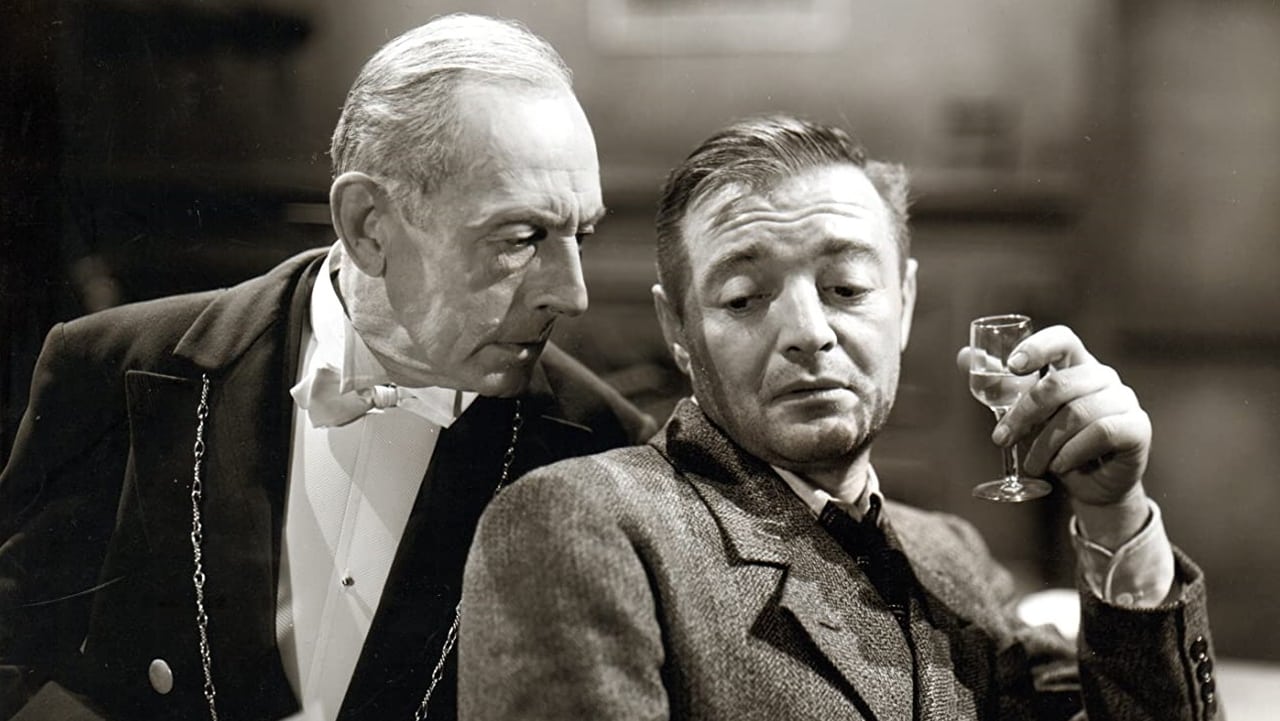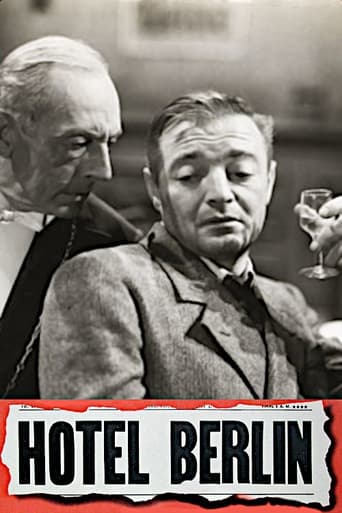

Interesting movie about the goings-on of various characters at the Hotel Berlin near the end of WWII. Specifically the search for a member of the German underground who has escaped from a concentration camp. Not surprisingly, this is from the author of Grand Hotel. Unlike the film adaptation of Grand Hotel, this one doesn't have an all-star cast but it does have a cast of solid character actors. Raymond Massey and Faye Emerson are standouts but really the whole cast is good. Peter Lorre steals the few scenes he's in. It's a pretty good though not great WWII movie with a unique setting and some frank (for the time) talk about concentration camps and the Holocaust. Also, if you ever wanted to see Alan Hale as a Nazi, here's your chance.
... View MoreAs the war against Nazi Germany is coming to a climax, this 1945 film revolves around several characters at a hotel in Berlin.Despite brief appearances, Peter Lorre and Alan Hale do some very fine dramatic acting, properly the best in their long careers.Andrea King is wonderful as the German actress staying at the hotel. When a concentration camp survivor escapes to the hotel, he meets up with her and is warned that she has strong Nazi sympathies. Her wavering back and forth ultimately does her in.The film tries to bring out that not all Germans are bad people, as written by President Roosevelt and Winston Churchill. Raymond Massey is such a German; although a General in the Germany army, he participated in the assassination plot and when caught, you know what he is told to do. That type of courageous German he is not.
... View MoreInitially, Germany might seem the last place for a story about the Nazi resistance, but that was the setting for "Hotel Berlin." After the success of the MGM movie "Grand Hotel," Vicki Baum sought to capture the public's interest with another bestseller Hotel Berlin '43, which was a similar tale about life in a hotel. This time the hotel teemed with intrigue in the bomb-shattered German capital. Warner Brother bought Baum's novel and assigned Jo Pagano and Alvah Bessie. Earlier he had co-scripted the Errol Flynn war film "Northern Pursuit." "Hotel Berlin" was director Peter Godfrey's seventh film. He shot it between November 15, 1944, and January 15, 1945. Fearing World War II would end before he could release "Hotel Berlin,"Jack Warner wanted this melodramatic opus completed as quickly as possible. "The Hollywood Reporter" of January 1, 1945, published an article about the frenzy of activity. The Reporter stated, "Continuing production momentum geared to put "Hotel Berlin" in release coincidental with Russian and Allied drives on German capital, Jack Warner has alerted all departments of the studio with objective of giving the Vicki Baum story a Broadway opening within a month."Scenarists Jo Pagano and Alvah Bessie made several important changes to Baum's novel. First, the bestseller contained an English character under house arrest who broadcasts propaganda to Great Britain. In addition, he needs medical attention requiring the use of morphine. Warner Brothers eliminated this character. Second, the movie changed the background of resistance protagonist Martin Richter, a former Nazi enlisted man who runs an anti-Nazi underground movement, to that a Jewish man who has escaped from a concentration camp and works with an anti-Nazi resistance group. They also shortened the span of the action from several days to a 24-hour period in the elite Hotel Berlin. During the 24-hour period, Martin Richter (Helmet Dantine of "Northern Pursuit") is a Jew who has escaped from a Nazi concentration camp. Richter hides in the hotel elevator shaft, later obtains a waiter's uniform, and circulates throughout the hotel. The famous German stage actress, Lisa Dorn (Andrea King of "Mr. Skeffington") tries to extricate herself from a bad situation by rescinding her Nazi beliefs and helping Richter until she discovers a way of out her problems with the Nazis by informing on Richter. A hotel waiter who is a member of the underground informs his compatriots and Richter reluctantly kills Lisa. Gestapo Commissioner Joachim Helm (George Coulouris of "Citizen Kane") discovers Richter in Lisa Dorn's room. Richter and Helm get into a fistfight; Richter strangles Helm, and drops his body into the elevator shaft. A blond hotel hostess, Tilli, (Faye Emerson of "Lady Gangster") yearns for a new pair of shoes. She is prepared to do whatever it takes to acquire them. She has an on-again and off-again affair with an arrogant Luftwaffe pilot, and simultaneously struggles to get a pair of shoes from another German officer. He finds himself in trouble with the Fatherland because he has too much money invested outside of Germany, and he refuses to bring it home. General Dahnwitz (Raymond Massey of "Desperate Journey"), an arrogant Nazi who participated in a plot to kill Hitler, learns he must commit suicide or suffer a worse fate from the Gestapo. Dahnwitz delays his suicide until Gestapo officers arrive and stand guard outside his room.The Production Code Administration warned Warner Brothers "with regard to the suicide of General Dahnwitz, it is important that it not in any way be glorified, or justified, but played practically as an execution ordered by the Gestapo." Joseph Breen reminded the filmmakers that the suicide must be an order. "To get away from any flavor of glorifying suicide," the chief PCA censor also told the studio to omit a line of Dahnwitz's dialogue in which he said, "And a bullet is a much more elegant way out than a stomach cancer or a prostate operation." Breen reminded the filmmakers not to show Lisa undressing any farther than her skirt and that they not expose Lisa's person when she bathes. The studio obliged Breen and simply deleted the undressing scenes. Breen demanded that Tilli never be filmed in a kimono, which the PCA considered the visual equivalent of sexual immorality. He also wanted the filmmakers to play out intimate scenes in sitting rooms rather than bedrooms.With one exception, Warner Brothers eliminated the scenes showing a bed. The studio, however, must have hashed out an agreement with the PCA because Tilli and the Nazi Major are shown in her bedroom fully dressed but never in bed together. Breen also wanted Warner Brothers to explain where Martin Richter spent the night in Lisa's room. The studio removed this scene. The only time that Richter spends anywhere overnight is in the shaft of the out-of-order elevator.After having read the incomplete revised Hotel Berlin script of August 29, 1944, Breen reminded Warner Brothers about General Dahnwitz's suicide and the problems it could pose which Breen had addressed before. They wanted nobody left in doubt about the reason for Dahnwitz's suicide and stressed that he must be ordered to die. Warner Brothers accommodated Breen on this point. In another storyline ultimately deleted from the script, Breen told the studio that it could not talk about supplying morphine to a dope addict. Not only was the reference to morphine removed, but also the studio deleted the character. Breen also warned the filmmakers about characterizing Tilli as a hotel prostitute."Hotel Berlin" bristles with intrigue, but this wartime film is totally forgettable today. The lack of charismatic actors and actresses and the shortage of cool violence make the film seem almost boring by comparison to better Warner Brothers features. Mind you, the performances are top-rate and Peter Godrey's direction is crisp and efficient. War movie buffs will appreciate this more than the typical viewer unless "Hotel Berlin" is a late night treat for an insomniac.
... View MoreHollywood was probably just as good and sick of making this sort of anti-Nazi propaganda picture as audiences were good and sick of seeing them. This stale, bitter melodrama has little to recommend it except for Peter Lorre's heartfelt tour de force as a former political prisoner who is (rather implausibly) released from a concentration camp to join the underground.
... View More